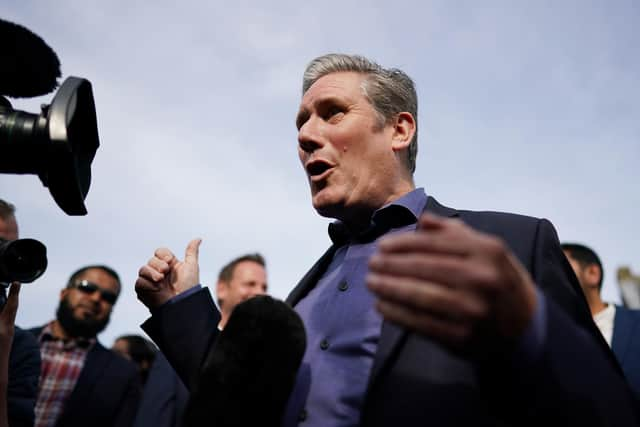As Tories prepare to ditch Boris Johnson, Keir Starmer is right to avoid getting drawn into their nasty strike strategy – Brian Wilson
The only effect of the rail strikes might have been to prevent even more people turning out to vote to get rid of Boris Johnson.
The mood is set that he is chancer unfit for office, heading an unpleasant government that is clueless about how to address urgent pressures on people’s daily lives. That is not going to change.
Advertisement
Hide AdAdvertisement
Hide AdAs the departing Conservative Party chair Oliver Dowden put it, “someone has to take responsibility” and, sooner or later, it will be Johnson himself they get rid of.


Labour’s comfortable win in Wakefield was encouraging for those who want to see a change in government but there is still a long way to go. With the prospect of industrial action cropping up all over the place, it will be necessary for Keir Starmer to plough his own progressive furrow and not be drawn onto ground on which the Tories choose to fight.
A revealing cameo this week featured the Transport Secretary, Grant Shapps, performing as a pantomime Tory. His snarling, sneering Dispatch Box performance about the rail dispute – when he should have been trying to resolve it – was crafted to sustain a “back to the 70s” mantra that has become their straw to clutch at. In reality, it served as a reminder of ingrained nastiness.
Most of the electorate weren’t even born in the 70s and have more pressing concerns for which Messrs Johnson and Shapps bear greater responsibility than caricature ghosts of the past. And Mick Lynch of the RMT has so far achieved the distinction of appearing more reasonable than Mr Shapps or the various sharp suits sent out to bat for Boris.
Few people like strikes but most can agree that offering public service workers two or three per cent pay increases at a time of double-digit inflation is more of a provocation than a serious proposition. It offends a sense of fairness and the evidence suggests industrial action is the best way to get attention.
It worked for Aslef, after ScotRail and the Scottish Government blundered into a totally unnecessary dispute which still hasn’t been concluded. Mersey Rail employees have voted overwhelmingly to accept 7.1 per cent which suggests that, just as with ScotRail, a decent offer can pre-empt disruption if government does not block it.
If ministers fail to turn railway workers into bogey-persons, they are even less likely to succeed when it comes to nurses and council workers who empty our bins. Yet this is the scene that is being set if unions are faced with unrealistic offers that would increase disadvantage for public sector employees.
With inflation at 11 per cent, well-heeled politicians telling the low-paid that their demands would be inflationary is an unpromising mission. If the Tories have any serious interest in pre-empting widespread industrial action, which is itself highly doubtful, they will leave negotiations to grown-ups whose objective is resolution rather than to stoke conflict for political ends.
Advertisement
Hide AdAdvertisement
Hide AdMr Lynch has obligingly pointed out that he is not a Labour Party member and bears it no loyalty. His job is to represent his members and not a political party. That is as it should be and Labour, equally, is right to avoid the trap of becoming cheerleaders for every industrial dispute, as opposed to being the potential government of social justice and workers’ rights.
That role will make it a natural ally in many disputes but history teaches the wisdom of respecting the separation of responsibilities that Mr Lynch defines.
Labour’s duty is to consumers as well as producers and to solutions in the interests of both. Sometimes industrial action will be misguided and a potential party of government must retain freedom to say so.
Labour’s job in opposition is to offer very different values and demonstrate the competence required to translate them into government. Whatever the taunts, Keir Starmer is right to avoid being drawn into the crude playbook that the Tories will seek to create.
Comments
Want to join the conversation? Please or to comment on this article.

